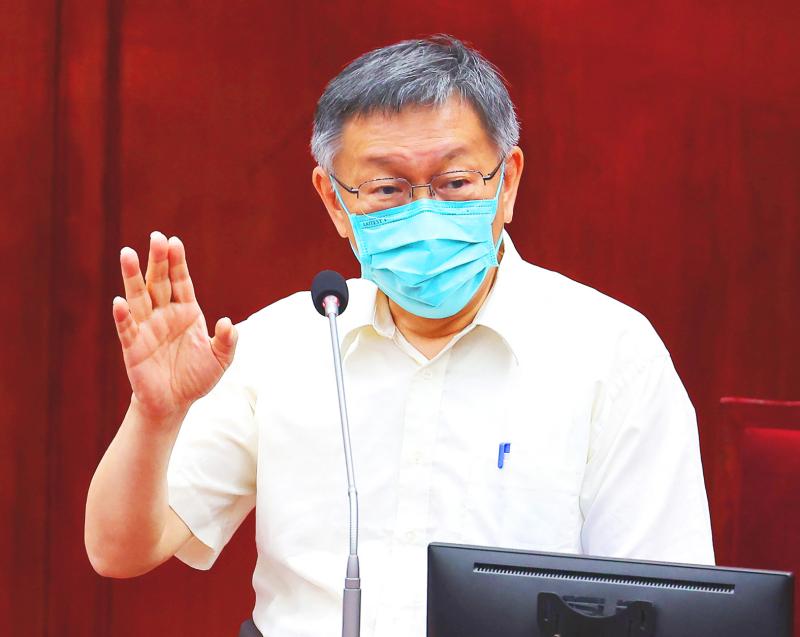The Taipei City Government yesterday announced that the Taipei-Shanghai Twin-City Forum is to be held on Tuesday in a “hybrid meeting” of the cities, with the theme of “resilience, sustainability and humanities.”
The forum would be held in the same hybrid meeting format as the past two years — with the two city mayors and city government officials in two venues meeting through videoconferencing due to COVID-19 restrictions, the Taipei City Government said.
With global warming driving natural disasters around the world, and as extreme weather can cause severe damage and threatens both cities, Taipei and Shanghai are striving to achieve sustainable development to become resilient and capable of adapting and facing disasters, it said.

Photo: CNA
The deputy mayors of the cities are each to give a speech on “energy saving and carbon reduction, and net zero emissions,” while sharing their cities’ policies and approaches to addressing climate change challenges, it said.
Based on the forum’s agenda, the meeting is to last about an hour, with the opening ceremony at 10:30am and the forum ending at 11:30am, making this year’s event the shortest since the first meeting in 2010.
At Taipei City Council meetings on Thursday and Friday, councilors asked Taipei Mayor Ko Wen-je (柯文哲) why the forum was being held, as the council in January passed a budget for the forum with a provision stating that “if the Chinese Communist Party’s [CCP] aircraft or warships continue to disturb Taiwan before the forum, the budget cannot be used.”
Ko brushed off the questions, saying that the definition of “CCP aircraft disturbing Taiwan” is unclear, and he also refused to confirm the date of the meeting.
Asked by Taipei City Councilor Lin Ying-meng (林穎孟) on Friday whether the mayor would express in his opening speech at the forum that Taiwan wants to be treated with “equal dignity” and that the CCP should not pursue a military attack, Ko said that he would.
Asked to elaborate on his speech plans, Ko yesterday said that Taiwan and China have close economic and trade relations.
Exports to China accounted for 42.3 percent of the total goods leaving Taiwan, but there is trouble when people of the two sides start to dislike each other, he said.
Moscow and Washington had a hotline during the Cold War, but Taiwan and China ignore each other, he said, adding that as there are more than 1 million Taiwanese in China and more than 300,000 Chinese spouses in Taiwan, there should still be communication between the two sides.
However, Ko said he had not added the demand of “Taiwan wanting equal dignity” to his speech, as the forum has always been about livelihood issues at the municipal level, and China has not intentionally taken advantage of Taiwan.
China’s Taiwan Affairs Office yesterday issued a news release praising the Twin-City Forum as an important exchange platform between Taipei and Shanghai.
Enhancing exchanges and cooperation is what people want, the office said.
It also supports expanded and in-depth exchanges between the two cities to benefit compatriots on both sides of the Taiwan Strait, it added.

Taiwanese can file complaints with the Tourism Administration to report travel agencies if their activities caused termination of a person’s citizenship, Mainland Affairs Council Minister Chiu Chui-cheng (邱垂正) said yesterday, after a podcaster highlighted a case in which a person’s citizenship was canceled for receiving a single-use Chinese passport to enter Russia. The council is aware of incidents in which people who signed up through Chinese travel agencies for tours of Russia were told they could obtain Russian visas and fast-track border clearance, Chiu told reporters on the sidelines of an event in Taipei. However, the travel agencies actually applied

New measures aimed at making Taiwan more attractive to foreign professionals came into effect this month, the National Development Council said yesterday. Among the changes, international students at Taiwanese universities would be able to work in Taiwan without a work permit in the two years after they graduate, explainer materials provided by the council said. In addition, foreign nationals who graduated from one of the world’s top 200 universities within the past five years can also apply for a two-year open work permit. Previously, those graduates would have needed to apply for a work permit using point-based criteria or have a Taiwanese company

The Shilin District Prosecutors’ Office yesterday indicted two Taiwanese and issued a wanted notice for Pete Liu (劉作虎), founder of Shenzhen-based smartphone manufacturer OnePlus Technology Co (萬普拉斯科技), for allegedly contravening the Act Governing Relations Between the People of the Taiwan Area and the Mainland Area (臺灣地區與大陸地區人民關係條例) by poaching 70 engineers in Taiwan. Liu allegedly traveled to Taiwan at the end of 2014 and met with a Taiwanese man surnamed Lin (林) to discuss establishing a mobile software research and development (R&D) team in Taiwan, prosecutors said. Without approval from the government, Lin, following Liu’s instructions, recruited more than 70 software

Chinese spouse and influencer Guan Guan’s (關關) residency permit has been revoked for repeatedly posting pro-China videos that threaten national security, the National Immigration Agency confirmed today. Guan Guan has said many controversial statements in her videos posted to Douyin (抖音), including “the red flag will soon be painted all over Taiwan” and “Taiwan is an inseparable part of China,” and expressing hope for expedited reunification. The agency last year received multiple reports alleging that Guan Guan had advocated for armed reunification. After verifying the reports, the agency last month issued a notice requiring her to appear and explain her actions. Guan